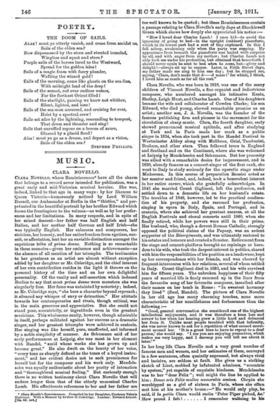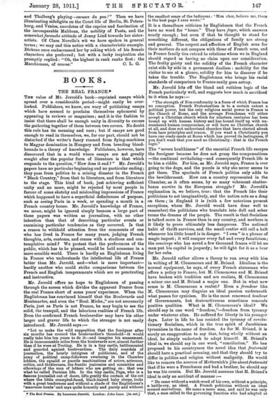MUS IC.
CLARA NOVELL°.
CLARA. NOVELL°, whose Reminiscences* have all the charm that belongs to a record never intended for publication, was a great early and mid-Victorian musical heroine. She was, indeed, linked to that age in many ways : by her likeness to Queen Victoria—humorously noticed by Lord William Russell, our Ambassador at Berlin in the "thirties," and per- petuated in the beautiful portrait by her brother Edward which forms the frontispiece to the volume—as well as by her prefer- ences and her limitations. In many respects, and in spite of her mixed descent—her father was half English and half Italian, and her mother half German and half Irish—she was typically English. Her calmness and composure, her stoicism, her honesty, and her entire freedom from egotism, con- ceit, or affectation, lent her an enviable distinction amongst the capricious tribe of prime donne. Nothing is so remarkable in these memoirs—given her eminence and achievements—as the absence of all mention of her triumphs. The testimonies to her greatness as an artist are almost without exception added by her daughter or Mr. Coleridge, and the chief interest of her own contribution resides in the light it throws on the personal history of the time and on her own delightful personality. Of the vanity and self-assertion which induced Berlioz to say that most prime donne were monsters she was singularly free. Her fame was untainted by notoriety; indeed, as Mr. Coleridge says, "she bore a character beyond reproach ; it silenced any whisper of envy or detraction." Her attitude towards her contemporaries and rivals, though critical, was in the main generous and appreciative. But she could not stand pose, eccentricity, or ingratitude even in the greatest musicians. This wholesome sanity, however, though admirable in itself, perhaps militated against her success as a dramatic singer, and her greatest triumphs were achieved in oratorio. Her singing was like herself, pure, unaffected, and informed by a noble simplicity of manner. As Schumann said of her early performances at Leipzig, she was most in her element with Handel, "amid whose works she has grown up and become great." He also dwelt on the beauty of her voice, "every tone as sharply defined as the tones of a keyed instru- ment," and her evident desire not to seek prominence for herself but for the composer and his work only. Mendels- sohn was equally enthusiastic about her purity of intonation and "thoroughbred. musical feeling." But curiously enough there is no written testimony about Clara Novella that will endure longer than that of the utterly unmusical Charles Lamb. His affectionate references to her and her father are
• Clara Notello'sRreilitiseences. Compiled by her Daughter, Coaitessa Valeria Gigliucei. With a Memoir by Arthur D. Coleridge. London: Edward Arnold. Bd. net./ too well known to be quoted ; but these Reminiscences contain a passage relating to Clara Novello's early days at ShackIewell Green which shows how deeply she appreciated his notice :—
" How I loved dear Charles Lamb! I once hid—to avoid the ignominy of going to bed—in the upright (cabinet) pianoforte, which in its lowest part had a sort of tiny cupboard. In this I fell asleep, awakening only when the party was supping. My appearance from beneath the pianoforte was hailed with surprise by all, and with anger from ray mother ; but Charles Lamb not only took me under his protection, but obtained that henceforth I should never again be sent to bed, when he came, but—glory and delight !—always sit up to supper. Later, in Frith Street days, ray father made me sing to him one day ; but he stopped me, saying, Clara, don't make that d—d noise l' for which, I think, I loved him as much as for all the rest."
Clara Novello, who was born in 1818, was one of the many children of Vincent Novello, a fine organist and industrious composer, who numbered amongst his intimates Keats, Shelley, Leigh Mint, and Charles Lamb. One of his daughters became the wife and collaborator of Cowden Clarke; his son Edward, who died young, showed remarkable promise as an artist; another son, J. A. Novello, was the founder of the famous publishing firm and pioneer in the movement for the circulation of cheap music. Clara, the fourth daughter, early showed pronounced musical aptitude, and after studying at York and in. Paris made her mark as a public singer in 1834, when she took part in the Handel Festival in Westminster Abbey along with Malibran, Grist Tamburini, Braham, and other stars. Then followed tours in England and Scotland and on the Continent, where she was welcomed at Leipzig by Mendelasolm and Schumann. But her precocity was allied with a remarkable desire for improvement, and in 1839, already famous as a concert-singer of the first rank, she went to Italy to study seriously for the operatic stage under Micheroux. In. this course of preparation Rossini acted as her mentor and friend, and, indeed, took a benevolent interest in her entire career, which she gratefully acknowledges. In 1843 she married Count Gigliucci, left the profession, and
settled down to a domestic life on her husband's estate. The troubles of 1848, however, led to the practical confisca-
tion of his property, and she resumed her profession, singing in opera in Italy, Spain, and Portugal, and in oratorio, where she achieved her greatest success, at all the English Festivals and choral concerts until 1860, when she finally retired, while her powers were still in their prime.
Her husband, who, though a devout Roman Catholic, strongly opposed the political claims of the Papacy, was an ardent supporter of the Risorgimento, and was ultimately restored to
his estates and honours and created a Senator. Retirement from the stage and concert-platform brought no repinings or bore- dom to his wife, who took the deepest interest in politics, shared with him the responsibilities of his position as a landowner, kept up her correspondence with, her friends, and was cheered by frequent intercourse with her relations, several of whom settled in Italy. Count Giglincei died in 1893, and his wife survived him for fifteen years. The unbroken happiness of their fifty years of married life is finely summed up in the lines from the favourite song of her favourite composer, inscribed after their names on her tomb in Rome: "In sweetest harmony
they lived" (Said, Handel). The picture of Clara Novello in her old age has many charming touches, none more characteristic of her unselfishness and forbearance than the
following
"Good, general conversation she considered one of the highest intellectual enjoyments, and it was therefore a keen loss and sorrow to her when her hearing grew a little hard and debarred her from it. Unlike most people troubled with that infirmity., she was never known to ask for a repetition of what caused merri- ment around her. 'It is a great bore to have to repeat to a deaf person,' she would say. 'I see you are enjoying yourselves, which makes me very happy, and I daresay you will tell me about it later:"
In her long life Clara Novello met a very great number of famous men and women, and her estimates of them, conveyed in a few sentences, often quaintly expressed, but always vivid and incisive, are seldom at fault. She gives us a striking sketch of Liszt, mobbed by infatuated admirers, "eccentric
by system," yet capable of exquisite kindness. Mendelssohn was to her "dear Felix "; well might the line be applied to him : Donee eris Felix multos numerable amieos. Chopin she worshipped as a girl of sixteen in Paris, where she often met him at his mother's house:—" He would only play, he said, if /a petite Clara would recite 'Peter Piper picked, &a' How proud I felt' I remember waltzing to hia
and Thalberg's playing--excuses du peu " Then we have illuminating sidelights on the Court life of Berlin, St. Peters- burg, and Venice, anecdotes of the caprice and fascination of the incomparable Malibran, the nobility of Pasta, and the somewhat farouche attitude of Jenny Lind towards her sister- artists. Of Clara Novello's wit we have spoken in general terms ; we may end this notice with a characteristic example. Dickens once embarrassed her by asking which of his female characters she preferred ; but with a lucky inspiration she promptly replied : "Oh, the highest in rank ranks first : the























































 Previous page
Previous page